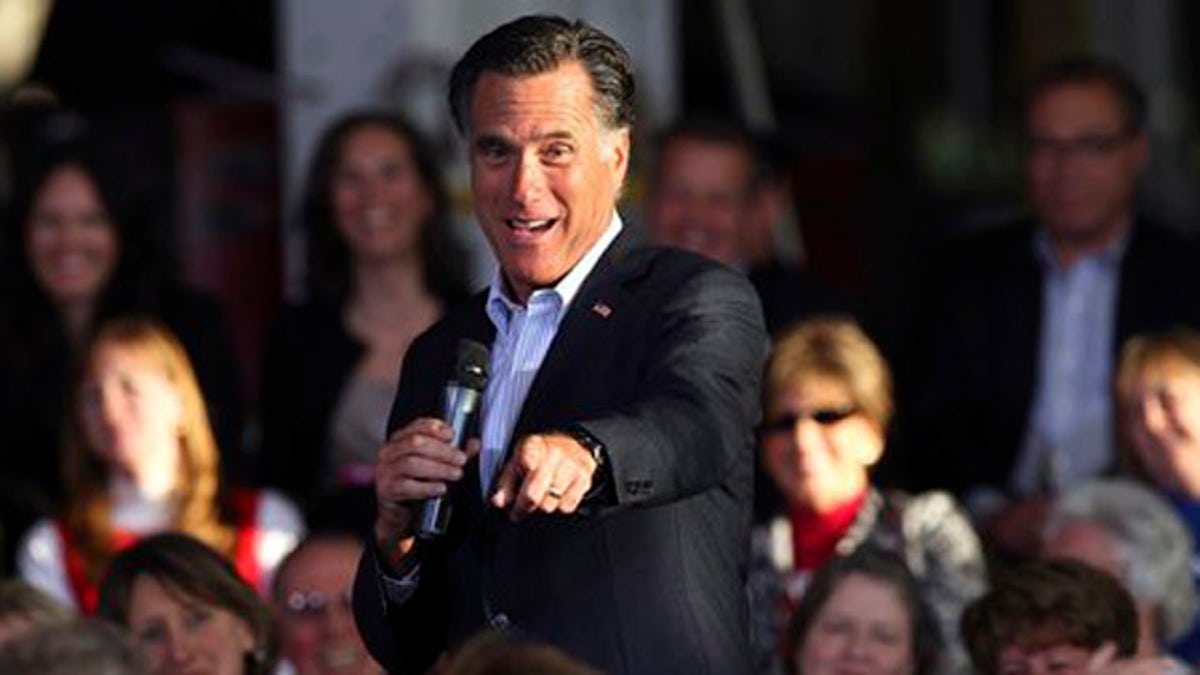
Republican presidential candidate, former Massachusetts Gov. Mitt Romney speaks during a campaign stop at RC Fabricators on Tuesday, April 10, 2012, in Wilmington, Del. (AP Photo/The Wilmington News-Journal, Suchat Pederson) NO SALES (The News Journal-2012)
The U.S. presidential race is down to two clear choices now that Rick Santorum has suspended his tenacious-but-shoestring GOP campaign and Mitt Romney has essentially secured the party's nomination.
A charismatic Democratic president, vulnerable to any sign that the tentative economic upswing might stall, faces off against a multimillionaire who has struggled to connect with his own party's conservatives but hopes his business background will convince voters he can put the country on a path to sturdier recovery.
Now Romney and President Barack Obama are free to focus on confronting each other, something they had already been increasingly doing in recent weeks as the former Massachusetts governor gradually emerged as his party's likely nominee.
Neither has hesitated to draw sharp contrasts with the other.
Obama, whose re-election prospects have been buoyed by the divisive state-by-state Republican primary race, said the choice facing voters this November was one of the starkest in recent history.
Traveling to Florida, Obama opened a new push to revamp the U.S. tax law under which wealthy investors often pay taxes at a lower rate than middle-class wage-earner. The proposal stands little chance of passing in Congress but serves as a clear general election contrast with Romney.
"We've got to choose which direction we want this country to go," Obama told a boisterous audience of students at Florida Atlantic University.
"Do we want to keep giving tax breaks to folks like me who don't need them?" he added, referring to his own personal wealth, estimated at between $1.8 million and nearly $12 million.
Obama said Democrats would ensure the rich pay their fair share, while focusing on investments in education, science and research and caring for the most vulnerable. By contrast, he said, Republicans would dismantle education and clean energy programs so they can give still more tax breaks to the rich.
Obama did not mention Romney by name, but the economic fairness message was the theme of his day -- and aimed squarely at the former governor, who once headed a private equity firm and is worth up to $250 million.
The renewed focus on the economy suits Romney, whose conservative credentials are suspect among the Republican base because of his past moderate stances on social issues such as abortion -- polarizing topics that were pushed to the forefront by Santorum's presence.
While Santorum was a favorite of the most conservative Republican voters, Romney, with his much better organized and well-financed campaign, had accumulated a virtually insurmountable lead in delegates to the party's national convention in August.
"We were raising issues that, well, frankly, a lot of people didn't want to have raised," Santorum said as he announced his decision in his home state of Pennsylvania, two weeks before the Republican primary vote there.
The former Pennsylvania senator pointedly made no mention or endorsement of Romney, whom he had derided as an unworthy standard-bearer for the Republicans.
Romney congratulated Santorum on his campaign, calling him an "able and worthy competitor."
Romney's campaign turned its attention to Obama's support for the so-called "Buffet rule", named after billionaire investor Warren Buffett, who famously said it was wrong for him to be paying a lower tax rate than that levied on his secretary.
Romney's team contends Obama's plan would raise taxes on small businesses, harming an engine of growth and job creation at a time when the economy needs it the most.
Obama is the "first president in history to openly campaign for re-election on a platform of higher taxes," Romney campaign spokeswoman Gail Gitcho said.




